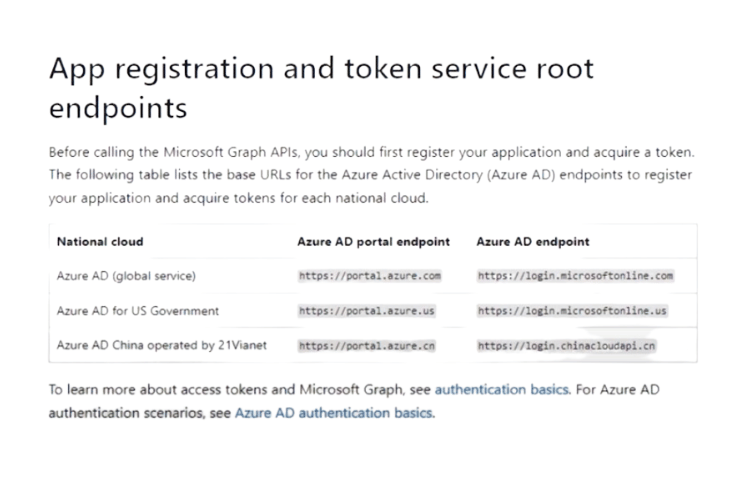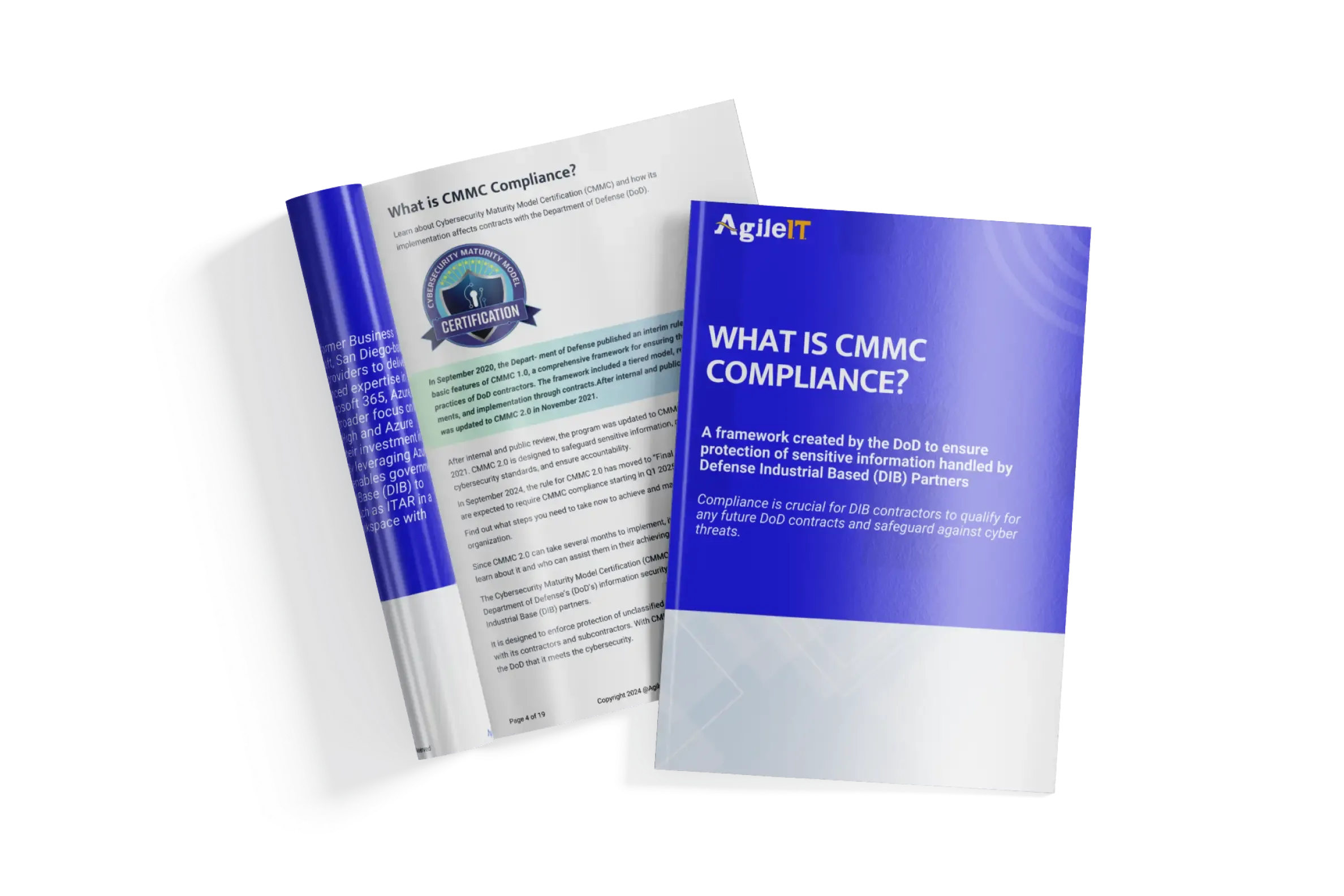Application Compliance for CMMC and FedRAMP High
If youve already built or about to build a web application that now needs to meet the Cybersecurity Maturity Model Certification CMMC and the Feder...

If you’ve already built or about to build a web application that now needs to meet the Cybersecurity Maturity Model Certification (CMMC) and the Federal Risk and Authorization Management Program (FedRAMP) High, then this post is for you.
If you’re here, then someone has already told you why this is required. If not, we have plenty of other content on this site to help explain it. Regardless, let’s jump into things.
In this blog post, we will discuss the essential steps to plan and test for consent flow and data management to integrating with GCC High Tenant, we will explore the fundamental aspects businesses must focus on to achieve compliance.
Graph Endpoints
Microsoft Graph is a unified API that provides access to data and intelligence across Microsoft 365, Azure Active Directory, and other Microsoft services. Graph endpoints are specific locations in the Graph where you can access data. Some examples of Graph endpoints include:
- /me - returns information about the signed-in user.
- /users - returns information about all users in the organization.
- /groups - returns information about all groups in the organization.
App registration and token service root endpoints are essential when integrating with Microsoft Graph API. An app registration is required to grant permission for an application to access resources in Microsoft Graph. The token service root endpoint is the URL used to obtain an access token necessary for authentication and authorization. Here are some key points to consider when working with app registration and token service root endpoints:
- App Registration
 This is registering an application in Azure Active Directory (Azure AD). You must register an application to obtain an app ID, which you will use to identify the application when making requests to Microsoft Graph. Additionally, app registration allows the application to authenticate and get permission to access specific resources.
This is registering an application in Azure Active Directory (Azure AD). You must register an application to obtain an app ID, which you will use to identify the application when making requests to Microsoft Graph. Additionally, app registration allows the application to authenticate and get permission to access specific resources.
- Token Service Root Endpoint
When calling Microsoft Graph APIs, you will use this URL to obtain an access token for authentication and authorization. The token service root endpoint differs depending on whether you use a personal, work, or school account.
- Permissions
After an app is registered, it must be granted permission to access specific resources in Microsoft Graph. The special permissions required will depend on the type of data you want to access and the actions you will perform.
- Token lifetime
Access tokens obtained through the token service root endpoint have a limited lifetime, after which they expire and can no longer be used to authenticate requests. It is essential to ensure that access tokens are refreshed before expiring to avoid application functionality interruptions.
Graph Delegate vs. Application
When accessing Graph endpoints, applications can use either Graph delegate or Graph application. Graph delegate refers to the permissions granted to users or groups to perform operations on behalf of others. Graph application, on the other hand, refers to permissions granted to an application to access data and perform operations.
It’s essential to understand the differences between Graph delegate and application when determining which approach to use for accessing data. Graph delegate is used when the application needs to access data on behalf of a user. In contrast, a Graph application is used when the application needs to access data independent of a user’s identity.
Integration with GCC High Tenant
GCC High is a cloud service offering by Microsoft that is designed to meet the security and compliance requirements of US government agencies and their partners. The GCC High environment provides additional security and compliance measures above and beyond the standard Microsoft 365 environment. This includes enhanced access controls, audit logging, and data protection measures. Here are some benefits of integrating with GCC High Tenant:
-
Enhanced security: GCC High provides enhanced security measures to protect data, including access controls, encryption, and data protection standards.
-
Compliance with regulations: Using GCC High ensures that vendors comply with the requirements of the DoD and other government agencies.
-
Streamlined collaboration: GCC High enables vendors to collaborate with their government clients and partners in a secure and compliant environment.
-
Competitive advantage: Integrating with GCC High gives vendors a competitive advantage in government contracting, demonstrating their commitment to security and compliance.
Application Scope and Access Control
Organizations must understand the scope of their applications and the access control mechanisms that govern them. Scoping refers to the boundaries of an application and what it can access. Limiting the scope of an application can help prevent data breaches and limit the damage if one occurs. Some important things to consider when scoping applications are:
- What data will the application access?
- What permissions does the application need to perform its functions?
- What data should be kept confidential?
While limiting application scope can be an effective way to protect data, it also has some limitations:
- Limiting scope can make it difficult for applications to integrate with other systems.
- The limited capacity can limit the functionality of the application.
Recommendations for Ensuring Compliance
Adopting best practices for securing data and managing access is essential to ensure compliance with regulatory requirements and industry standards. Here are some of our recommendations for ensuring compliance in Azure Active Directory (Azure AD):
- Use Azure Vault for Secrets and Certificate Management
Azure Key Vault is a cloud-based service that provides secure storage and management of secrets, such as passwords and certificates. Here are some reasons why using Azure Key Vault is recommended:
- It provides centralized management of secrets, reducing the risk of unauthorized access.
- It allows you to define access policies and audit access to secrets.
- It integrates with Azure AD, making it easy to manage access to secrets based on user and group memberships.
- Add Consent as Needed for Required Scopes
Azure AD allows you to define application permissions, which determine what data an application can access on behalf of a user. When an application requests permissions that require admin consent, the tenant admin must grant consent before the application can access the data. Here are some reasons why adding consent as needed is recommended:
-
It ensures that users are aware of the permissions an application is requesting.
-
It allows you to control which applications can access sensitive data.
-
It enables you to audit consent grants and revocations.
- Limit Application Scope
By limiting the scope of an application, you can reduce the risk of unauthorized access to data. Here are some recommendations for limiting application scope:
- Use the principle of least privilege when defining application permissions.
- Use conditional access policies to control application access based on user and device risk.
- Use network security groups to limit inbound and outbound traffic to and from the application.
Maximize Your Application Compliance With Agile It
Ensuring compliance with federal regulations such as FedRAMP High and CMMC is crucial for any organization handling sensitive government data. Failure to comply can lead to severe consequences, including legal action and reputational damage. However, organizations can achieve compliance and secure sensitive data with careful planning, testing, and integration with GCC High Tenant.
Implementing the best practices and recommendations outlined in this blog post, such as scoping and limiting application scope, using Azure Vault for secrets and certificate management, and adding consent for required scopes, can help you meet these regulations.
Agile IT has helped billion-dollar SaaS businesses meet federal regulations and enter the FedRAMP marketplace. We can secure the most complex cloud and hybrid environments. Contact us today to find out how we can help you meet FedRAMP High and CMMC requirements for your applications.






